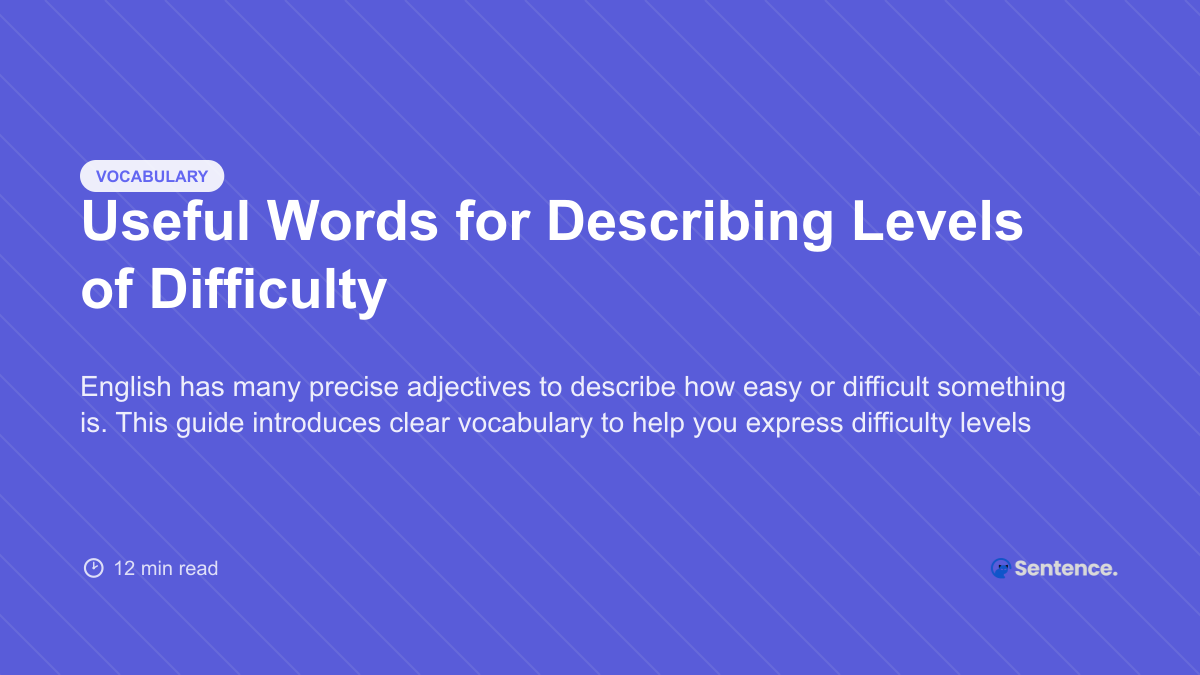
Useful Words for Describing Levels of Difficulty
English has many precise adjectives to describe how easy or difficult something is. This guide introduces clear vocabulary to help you express difficulty levels naturally and confidently.

English has many precise adjectives to describe how easy or difficult something is. This guide introduces clear vocabulary to help you express difficulty levels naturally and confidently.
Every day we talk about tasks, challenges, and activities that feel easy, hard, or somewhere in between. But many learners use only basic words like “easy” or “difficult.” English actually offers a wide range of adjectives to describe different degrees of difficulty with more precision.
This article introduces useful vocabulary for expressing various difficulty levels, from very easy tasks to extremely challenging ones. You’ll learn clear meanings, example sentences, and practical ways to use these words in everyday conversation or writing.
Some tasks feel simple and require little effort. English uses several adjectives to show that something can be done without stress or difficulty. These words are helpful in instructions, recommendations, and daily conversations.
| Word | Meaning | Example |
|---|---|---|
| simple | easy to understand or do | The instructions were clear and simple. |
| straightforward | easy because there is no confusion | The task is straightforward if you follow the steps. |
| effortless | requiring almost no effort | She made the dance look effortless. |
| manageable | easy enough to handle or complete | The workload is manageable today. |
These adjectives are useful when describing tasks that don’t feel stressful, especially when offering help or giving advice to others.
Not everything is easy, but not everything is difficult either. Some tasks fall in the middle — they require effort but are still doable. These adjectives help express that balanced feeling of challenge.
| Word | Meaning | Example |
|---|---|---|
| challenging | requiring effort but interesting | The puzzle was challenging but fun. |
| demanding | needing a lot of effort or attention | The project is demanding but rewarding. |
| complex | having many parts or details | The software is quite complex for beginners. |
| involved | complicated or requiring many steps | The process is too involved for a quick fix. |
These verbs help express that a task takes time or concentration but is still possible to complete with effort.
Some tasks push our limits or require advanced skills. English has strong adjectives that show something is hard, frustrating, or extremely challenging. These words are helpful in academic, professional, or personal contexts.
| Word | Meaning | Example |
|---|---|---|
| difficult | hard to do or understand | The exam was extremely difficult. |
| tough | physically or mentally hard | It’s a tough decision to make. |
| complicated | hard because of many details | The instructions were too complicated to follow. |
| overwhelming | too much to handle | The amount of work felt overwhelming. |
These adjectives express higher levels of difficulty and help you communicate stress, frustration, or the need for support.
Sometimes a task feels nearly impossible. In those situations, English uses stronger adjectives to show that something requires exceptional skill or effort. These words are common in emotional discussions or dramatic descriptions.
| Word | Meaning | Example |
|---|---|---|
| impossible | cannot be done | The deadline felt impossible to meet. |
| backbreaking | physically exhausting | The work was backbreaking after several hours. |
| exhausting | very tiring | Hiking up the mountain was exhausting. |
| punishing | extremely harsh or demanding | The training schedule is punishing for beginners. |
These expressions help you emphasize the intensity or difficulty of a task, especially in storytelling or emotional descriptions.
Difficulty vocabulary becomes easier to learn when you connect each word to real experiences. Think of situations where something felt effortless, complicated, or overwhelming. Associating these adjectives with personal memories helps you choose the right word naturally in conversations or writing.
Memory Tip:
Match the adjective to the intensity: simple → manageable → challenging → tough → impossible.
Answers: simple / challenging / exhausting / overwhelming
⭐ Pro Tip: Precise difficulty words make your descriptions clearer, more natural, and more professional.
English offers many useful adjectives for describing levels of difficulty, from simple tasks to extremely challenging ones. Learning these words helps you express your experiences more accurately and makes your communication more engaging. With regular practice, you’ll be able to choose the perfect word to describe any level of difficulty in daily life or work.